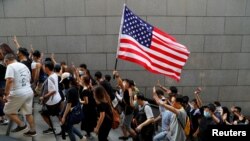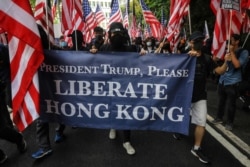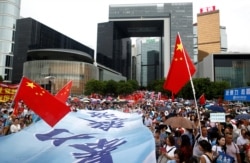A Chinese state-run newspaper Monday said the United States will be meddling in Hong Kong internal affairs if the U.S. Congress moves forward with a bipartisan bill in support of the city’s democratic development and human rights.
Analysts say Beijing continues to ramp up efforts to sway global opinion on the political crisis in Hong Kong after its strategy of ‘patiently waiting it out’ seems to have not worked effectively.
The city’s anti-government protests have lasted for nearly three months and shown few signs of abating especially after the entrance of a Central Metro station was set on fire on Sunday amid escalating tensions between pro-democracy activists and police.
Deep Intervention
In an editorial, titled “Washington has no right to define HK’s high degree of autonomy,” the Global Times argued that “the passage of the bill would constitute as a deep intervention in Hong Kong affairs, but it won't become a leverage to influence Beijing's decisions on the city's affairs.”
Washington only aims to insert pressure on Beijing for its own gains, the governmental mouthpiece went on to say, insisting that China will not cave into pressure but stand firmly behind its practice of ‘one China, two systems’ formula in Hong Kong.
“The city’s future will depend on how strong China is, and not on U.S. attitude toward Hong Kong,” the paper concluded.
Leaders of both the U.S. Senate and House recently pledged to advance the Hong Kong Human Rights and Democracy Act, which, if passed, would require Washington to annually assess the former British colony’s level of autonomy from Beijing and cancel its trading privileges if that autonomy is compromised.
Sanctions would also be imposed on officials who undermine the city’s autonomy.
Liberating Hong Kong
Thousands of Hong Kong protestors marched to the city’s U.S. consulate Sunday, calling on Washington to “liberate” the city by passing the bill and offering help in their struggle to acquire greater political freedom.
Shi Yinhong, an international relations professor at Beijing's Renmin University, however, said that prospects of the bill’s passage will be dim, given China uses no military forces in the city, a precondition for the U.S. to mull the bill.
“The Chinese government will never resort to military forces unless it is absolutely necessary. So, for now, I think it’s difficult for the bill to be passed in the U.S. Congress. Even if it is passed, the Trump administration won’t probably approve it,” said the professor.
Another China watcher Chao Chun-shan disagreed, saying it is within the U.S.’s rights to advance the bill given freedom, democracy and human rights are universal values.
And such a bill will be in the interests of the city’s pro-democracy activists as it exerts a certain level of pressure on the Chinese government, he said.
Red Line
But it will neither ease the way Beijing handles the city’s unrest, nor reverse Beijing’s decisions to deny universal suffrage to the city’s 7.5 million citizens, said Chao, chief advisor to the Taipei-based Foundation on Asia-Pacific Peace Studies.
“That’s a red line. [In its eyes,] China’s existing political structure cannot be affected especially the ‘one country, two systems’ [scheme],” he said.
Chao added that China will continue to adopt a wait-and-see attitude or what he calls “strategic patience” toward Hong Kong.
Some analysts speculated that division is seen in China’s top leadership as some party leaders are said to have called for more concessions while others urged strong action to bring the city under the mainland’s direct control.
Chinese President Xi Jinping is also said to have come under fire for some blamed him for having mishandled the city’s crisis.
But Chao said, after the extradition bill has been withdrawn, there’s little room for Chinese authorities to deliver more concessions.
Two-Trick Strategy
Instead, China may exert more pressure by mobilizing the city’s pro-Beijing business community to voice opposition to violent protests, according to analysts.
For example, two of the city’s pro-China businesswomen are slated to speak to the United Nations Human Rights Council on Tuesday, defending the city government’s handling of the protests.
“The views of a small group of radical protesters do not represent the views of all 7.5 million Hongkongers,” the pair will say, according to a copy of their speech posted on the top human rights body’s website.
“The systematic and calculated violent acts of this group have never been condoned by all Hongkongers,” their statement added.
What is at play is Beijing’s two-hand strategy, according to Chao.
“The pressure on one hand and compromise on the other. We call this a two-trick strategy,” he said.






